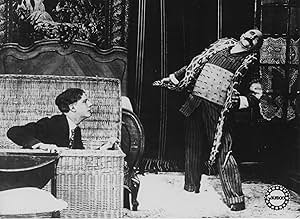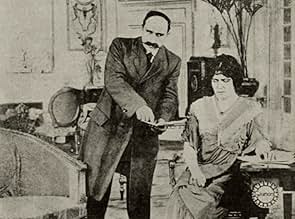AVALIAÇÃO DA IMDb
6,9/10
2,7 mil
SUA AVALIAÇÃO
Adicionar um enredo no seu idiomaInspector Juve is tasked to capture the infamous criminal genius Fantômas who, ruthless and particularly elusive, changes his appearance and holds Paris' high society in a crippling grasp.Inspector Juve is tasked to capture the infamous criminal genius Fantômas who, ruthless and particularly elusive, changes his appearance and holds Paris' high society in a crippling grasp.Inspector Juve is tasked to capture the infamous criminal genius Fantômas who, ruthless and particularly elusive, changes his appearance and holds Paris' high society in a crippling grasp.
- Direção
- Roteiristas
- Artistas
- Prêmios
- 1 indicação no total
Edmund Breon
- Inspector Juve
- (as Edmond Bréon)
André Volbert
- L'acteur Valgrand
- (as Volbert)
Avaliações em destaque
A multiple-reel drama in which there are good situations and well handled. M. Navarre plays a dual role and does splendid work. Opposite him is the Gaumont's famous leading woman, Mme. Renee Carl; she justifies every expectation. The story is of a bold thief, of the gentleman sort, who commits a robbery. He has also committed a murder. After his arrest and conviction, the wife of the murdered man, in love with the thief, bribes the keepers of the latter to bring him to her home, a short distance from the prison. It is the night preceding his execution. The same evening, a famous actor gives a representation of the condemned man in his cell. The impersonator is decoyed to the house of the woman after the murderer has arrived. He is still in his convincing make-up. After the woman has drugged him, the jailers take him back to his cell. As he is being prepared for the execution, a detective discovers that the man still under the influence of the drug is not the murderer. The final curtain is to the effect that "Henceforth it is Juve (the detective) versus Fantomas." So we may expect a continuance of the story at a later time. The picture will interest. - The Moving Picture World, June 28, 1913
Everything perfect in Louis Feuillade's FANTOMAS series.Action is very expressive and leave behind any possible dialog.Gestures of actors are accurate and laconic.Text between grounds styled in form of visiting cards or newspaper articles.Much significance have the space outside of frame.Stairs,curtains,lifts,windows and walls are produced the intricate labyrinth where every becomes victim or criminal.Poor decorations work as guide in this tangled area.This active space of film no need special effects or even camera travelings.As result we have pure cinematic product which speak with audience by language of images.Leterature and theater resources are slaves of this cinema triumph.
Fantômas (Rene Navarre) makes it as the emperor of Crime. First is the robbery at the Royal Palace Hotel. Then he abducts Lord Beltham...
Critic Maurice Raynal wrote that "There is nothing in this involved, compact, and concentrated film but explosive genius." I absolutely agree with this assessment.
Film historians (and amateurs like myself) tend to focus on American innovation (Thomas Edison) and the rise of the German film. While these are important areas (I believe the Germans did more for cinematography than any other group), "Fantomas" shows that the French were in the game, too.
This is an incredible film, and it has been touched up very nicely by the folks at Kino. It could easily pass for being the 1920s...
Critic Maurice Raynal wrote that "There is nothing in this involved, compact, and concentrated film but explosive genius." I absolutely agree with this assessment.
Film historians (and amateurs like myself) tend to focus on American innovation (Thomas Edison) and the rise of the German film. While these are important areas (I believe the Germans did more for cinematography than any other group), "Fantomas" shows that the French were in the game, too.
This is an incredible film, and it has been touched up very nicely by the folks at Kino. It could easily pass for being the 1920s...
NOTE: This isn't a review of the entire "Fantomas" film serial (which, in its entirety, is 5 1/2 hours in length), but of the 54 minute film that starts off the series.
In 1913, a bit over a hundred years prior to this review, cinema was a lot different. There weren't nearly as many ways to explore feelings of humor, anger, and sadness on the screen as there are in today's cinematic world. However, around this time, a few filmmakers began to change the way film was, filmmakers like Georges Melies, D.W. Griffith, and Louis Feuillade, the director of this film.
While I'm sure that the film serial gets far more interesting and entertaining as it goes on, this installment was surely great! Already, there's murder, suspense, and crime as well as some pretty interesting filmmaking techniques (ex: use of close ups, a newly invented technique at that time).
Overall, it definitely makes me excited for the rest of the film serial!
In 1913, a bit over a hundred years prior to this review, cinema was a lot different. There weren't nearly as many ways to explore feelings of humor, anger, and sadness on the screen as there are in today's cinematic world. However, around this time, a few filmmakers began to change the way film was, filmmakers like Georges Melies, D.W. Griffith, and Louis Feuillade, the director of this film.
While I'm sure that the film serial gets far more interesting and entertaining as it goes on, this installment was surely great! Already, there's murder, suspense, and crime as well as some pretty interesting filmmaking techniques (ex: use of close ups, a newly invented technique at that time).
Overall, it definitely makes me excited for the rest of the film serial!
Fantômas - À l'ombre de la guillotine (1913)
*** (out of 4)
The first of a five film series has Rene Vacarre playing Fantomas, the mastermind French thief who breaks into the hotel of a princess and steals some priceless jewelry. Inspector Jive (Edmund Breon) finally manages to catch Fantomas but he plans an escape hours before heading to the guillotine. FANTOMAS: IN THE SHADOW OF THE GUILLOTINE isn't a masterpiece by any stretch of the imagination but at just 54-minutes the thing is entertaining enough to make it worth viewing if you enjoy silent cinema. I think the one thing this picture shows is that during this era the American cinema was still miles ahead of the French and even when Feuillade was considered the country's greatest director at this time. As with many of his earlier pictures, the director usually tells the story in simple medium shots and he really doesn't use any noticeable editing to try and build up any suspense or drama. The director pretty much just tells the story without any real flair or style and while this might kill some films from this period, Feuillade at least keeps the story moving at a nice pace to where it never gets boring. The film is basically broken down into three sections. The first dealing with the hotel robbery, the second with Fantomas' arrest and the third his eventual escape. The first segment was actually the most entertaining as the sets were rather interesting to look at and we get a unique opening showing an elevator climbing several floors. The trick editing is obvious but this sequence still has a unique look to it. The third story has a very far-fetched idea to get Fantomas out of jail but it somewhat works in a cliffhanger-like fashion. Vacarre is wonderful in his role(s) as he's certainly photogenic and manages to make you believe he could actually pull all of this stuff off. I was also impressed with Breon even though he's featured a lot less.
*** (out of 4)
The first of a five film series has Rene Vacarre playing Fantomas, the mastermind French thief who breaks into the hotel of a princess and steals some priceless jewelry. Inspector Jive (Edmund Breon) finally manages to catch Fantomas but he plans an escape hours before heading to the guillotine. FANTOMAS: IN THE SHADOW OF THE GUILLOTINE isn't a masterpiece by any stretch of the imagination but at just 54-minutes the thing is entertaining enough to make it worth viewing if you enjoy silent cinema. I think the one thing this picture shows is that during this era the American cinema was still miles ahead of the French and even when Feuillade was considered the country's greatest director at this time. As with many of his earlier pictures, the director usually tells the story in simple medium shots and he really doesn't use any noticeable editing to try and build up any suspense or drama. The director pretty much just tells the story without any real flair or style and while this might kill some films from this period, Feuillade at least keeps the story moving at a nice pace to where it never gets boring. The film is basically broken down into three sections. The first dealing with the hotel robbery, the second with Fantomas' arrest and the third his eventual escape. The first segment was actually the most entertaining as the sets were rather interesting to look at and we get a unique opening showing an elevator climbing several floors. The trick editing is obvious but this sequence still has a unique look to it. The third story has a very far-fetched idea to get Fantomas out of jail but it somewhat works in a cliffhanger-like fashion. Vacarre is wonderful in his role(s) as he's certainly photogenic and manages to make you believe he could actually pull all of this stuff off. I was also impressed with Breon even though he's featured a lot less.
Você sabia?
- ConexõesFeatured in Fantômas 70 (2001)
Principais escolhas
Faça login para avaliar e ver a lista de recomendações personalizadas
- How long is Fantômas: In the Shadow of the Guillotine?Fornecido pela Alexa
Detalhes
- Data de lançamento
- País de origem
- Central de atendimento oficial
- Idiomas
- Também conhecido como
- Fantômas: In the Shadow of the Guillotine
- Locações de filme
- 3 Rue Huraut, Villemomble, Seine-Saint-Denis, França(Beltham's house)
- Empresas de produção
- Consulte mais créditos da empresa na IMDbPro
- Tempo de duração54 minutos
- Cor
- Mixagem de som
- Proporção
- 1.33 : 1
Contribua para esta página
Sugerir uma alteração ou adicionar conteúdo ausente



























